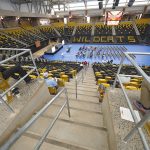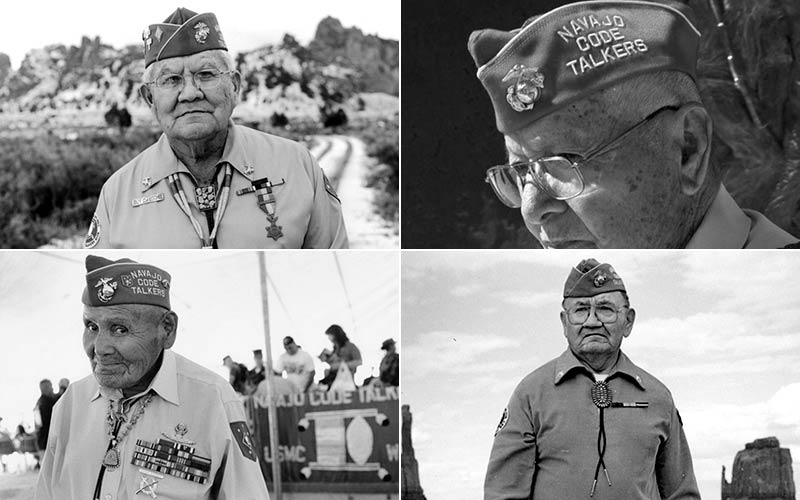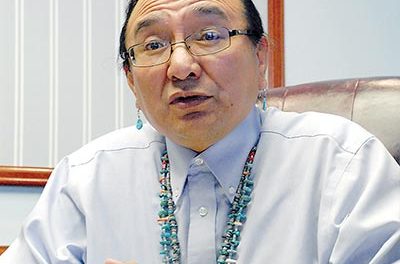
Letters: Thank you, code talkers

Code talkers Robert Walley, Guy Clauschee, Wilford Buck, and David Jordan.
Please express the depth of our profound gratitude to the remaining Diné Code Talkers for their sacrifice of service during the Pacific war, something that our president found difficult to do.
Their dedicated service to our country was essential to victory in the Pacific and we thank and honor them.
All Americans should visit the Code Talker Memorial in Window Rock, as a fitting memorial to the service of these gallant American soldiers. May they walk in beauty.
Steve and Marcia Clevenger
Guthrie, Okla.
We need a real Veterans Act
We Navajo veterans at the hogan level and most probably our comrade veterans drifting in rez border towns or urban ghettos rely mainly on newspapers to remain aware of what is going on as far as funds for us are concerned.
However, what has been in print as of recent has been and is frustrating, embarrassing and unbelievable; shenanigans, which mock and can cause mockery of our elected leaders, have stymied funding for us veterans. Simple need for literacy and need for fiscal orientation seemingly forced me to ask, “Who is doing the legislative writing for either or both of our Council and our president’s office?” Perhaps the delay is caused by a continuation of recent official exclusion of professional involvement in tribal business, negotiations, I believe.
Our hope and expectations are that our Council has lifted the exclusion of professional help. We have not heard of an official lifting, but maybe such action may not make much difference, as at one time recently, our lead tribal attorney contended officially that “no” means “yes” and “yes” means “no.” Understandably when such language appeared our voters were befuddled. But, of course, now we have Navajo lawyers and tribal staff with a Ph.D. who should help to nullify need for education and focused fiscal orientation for our prestigious decision-makers.
Admitted the four percent usually deducted prior to deposits as interest into the veterans trust fund is becoming considerably smaller in amount due to the proportionate decline of our tribute’s national income, but whatever is available should not be withheld due to need for education or fiscal orientation. Our Council should just be over-mindful that amount in reserve for veterans require a 2/3 vote to access.
Also, even if there is esoteric language in a proposed resolution requiring need for education and orientation, of greater importance is need for transparency in our government. There is also need for inter-breach opportunity to talk or negotiate proposed resolution prior to being tossed into the unilateral happier by passing all interventions to avoid possible costly override efforts which also caused delays and possible undue delay hardships to the public in many instances.
Important also is need for bona fide Navajo Veterans Act. I might emphasize that the resolution that is being proclaimed officially as being our Veterans Act is simply a resolution shifting Navajo Veterans Administrative from one level to another level of the tribe’s administration where it is more vulnerable to the whims of tribal politics. The Navajo Veterans Act needed should be one which provides for a semi-autonomous regional unity by which Navajo veterans are officially recognized at all levels and major funding for them is directly from the federal government. In this way our veterans should not be in the fiscal fix that can continue.
After all, Trump likes ways and his shoulders/veterans. Finally, as an old Navajo veteran concerned with benefits for present and future Navajo veterans, I urge that funds be made available soon and ever timely without random dipping into our reserve funds, especially for veterans in greatest need and those who served on the front lines.
Dan Vicenti
Crownpoint, N.M.
County must be redistricted
I understand the reason the Navajo Nation sued San Juan County Utah over voting districts because the lines were unconstitutionally drawn by the county commissioners, in which the election districts were in violation of the 1965 Voting Rights Act, leading to discrimination of Native Americans’ right to a fair election.
I have been following stories about gerrymandering in this country and San Juan County, Utah, was one of the noteworthy cases to follow. San Juan County has three county commission seats and has 53 percent Native American population. Yet, the commissioners placed 93 percent of 53 percent Native American population to vote in one district. Thus, San Juan County Commissioners’ district plan allowed only one Native American (Navajos being majority) representation despite being majority of the population and Native Americans never held two county commission seats.
The fact is not about the Navajos losing elections in other districts, but rather that the white people who wield control continue to insist (in 2017) that Native Americans should not enjoy the same government services enjoyed by other county residents. Those who wish to continue the control believe that it is the Navajos’ job to provide the very services that they receive millions of dollars to provide the services to Navajo residents yet, those who wish to continue to control services also sit on millions of dollars belonging to the public while they say no services to the Navajo people.
It is evident that San Juan County officials believe that Native American poverty is not caused by their actions but by Native Americans’ actions.
To prove misconceptions wrong, Utah Navajos sued the San Juan County and the state of Utah seven times over 30 years for discriminatory provision of government services to the Utah Navajos. In all cases, Utah Navajos have won the lawsuits and suing over redistricting is no different.
Many Utah Navajos continue to live in substandard conditions with no running water and no electricity. Their children commute long distances, requiring hours of driving to attend school. Meanwhile, elected officials invite oil companies to wreak havoc on their lands.
On the other hand, non-Navajos in San Juan County continue to live in prosperity, receive prompt services from first responders, live without impacts from pollution, and access and receive wide range of county and state services even though our Navajo people pay for these services.
I am not arguing that non-Native Americans are racists, but what I am saying is that existing system set in place is designed unjust, unequal and should change. I invite the federal judge to choose any independently drawn boundary not determined by race, which will be an improvement over the grossly gerrymandered districts that the Native Americans are subjected to in San Juan County, Utah.
I think if voting district boundaries change, systems and services will improve. Native Americans (Navajos) will build roads, libraries, public safety, recreation facilities and jobs outside municipalized towns like Monticello and Blanding. Native Americans will be hired to balance out the inequality in county and state jobs to curtail current state of inequity (over 90 percent of county jobs held by non-Native county residents).
Nearby states with Apache County, Arizona, and McKinley County, New Mexico, do employ Navajo residents as majority to reflect the population of counties. Those two counties are doing an excellent job of ensuring equality in provision of county government services. I do not see the current San Juan County officials demonstrating equality and fairness.
Many Navajos worked on redistricting in the 1960s and 1970s, which eventually led to the first Native American elected to public office in Utah in 1986. Noteworthy individuals include: Seth Bigman and Ben Yanito (currently living); Curly John, Evans Holly, Fernandez Begaye, David Yanito, Chester Bitsui, Eddie Nakai, John Bill Maryboy, Ben Whitehorse, Curtis Dee and Harold Drake (all passed on) who taught the Navajo people the importance of the right to vote in Utah County and state elections.
They often said the Navajo population is growing and they predicted, one day, population will become the majority in the county. They emphasized careful selection of an individual who will represent the people as a leader.
So, it is time to entrust the Special Master Grofman and the federal judge to carry out their duty to redraw boundaries in fairness. It is up to us as Native American citizens (Ute, Paiutes, Navajos, etc.) to finally change the face of many forms of injustice in San Juan County, Utah.
Native Americans residing in the county have problems with inadequate services in roads, water, jobs, education and protection of heritage. Likewise, it took a lawsuit by an Isleta Pueblo named Miguel Trujillo Sr. to pave the way for the Indians of New Mexico for right to vote in 1948. On Aug. 3, 1948, the federal court in Santa Fe ruled that New Mexico had discriminated against its Indians by restricting the vote. Miguel Trujillo was a World War II Veteran who was denied to vote.
The past few years, the Navajo Nation has been busy to revisit redistricting map with the state of New Mexico and state of Arizona to ensure that there is balance districts drawn to prevent one side from winning. Persons residing in Cibola County have called for Navajo to run for the next public education school board elections.
Population of the Native Americans is growing and we established a political clout, thus, our Indian nations do need to revisit the redistricting map to ensure equity and justice. After all, we are citizens of our tribe, our county, our state, and country, which gives us more duties to be diligent when it comes to our right to vote (foundation of democracy).
Dorothy Redhorse
Tse Alnaozt’i’ N.M.
To read the full article, pick up your copy of the Navajo Times at your nearest newsstand Thursday mornings!
Are you a digital subscriber? Read the most recent three weeks of stories by logging in to your online account.







 Highway 264,
Highway 264, I-40, WB @ Winslow
I-40, WB @ Winslow